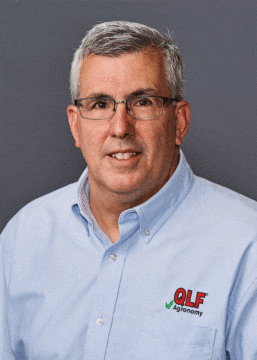Kirk Moyer – QLF Regional Sales Agronomist
What’s important to you when trying to determine what agronomy products will work best on your farm? Testimonials from growers are always good and appreciated, understanding what the neighbors are doing locally may be helpful, and even supporting science published in articles from institutions of higher learning can help. One or all can be extremely useful when making those decisions. One of the best ways to make good decisions on the farm is through third-party replicated trials. The objective of a field experiment is to find scientific means of enhancing the quality and quantity of physical resources for crop production. Various practices and factors affect or determine crop performance and yield in the field. Nothing could be truer than that when introducing, comparing, and quantifying QLF Agronomy’s Liquid-Carbon Based Fertilizer (L-CBF).
Field experiments offer researchers and companies a way to test theories and answer questions with higher external validity because they simulate real-world occurrences. Some researchers argue that field experiments are a better guard against potential bias. With QLF’s unique formals and cane molasses-based fertilizers, it was imperative to have that real-world third-party replicated data. In order to compare to perceived industry leaders, the best way is to go head-to-head with those leaders. But more critical is to find a research company or firm that you trust with designing and executing that trial work.
One such company that QLF utilizes is Mid-Michigan Agronomy at 8333 S Dewitt Rd, Dewitt, MI 48820. Mid-Michigan Agronomy was established in 2005. Robert Schafer, Director and Founder, of Mid-Michigan Agronomy performs a myriad of trials on many crops in the Midwest. Those crops include potatoes, corn, soybeans, sugar beets, wheat and many more. Their lab in Dewitt Michigan is designed to do soil and root sample tests for nematodes as well as fry samples on potatoes. A huge part of their time is also spent consulting on with potato growers and companies. Their business takes them to Indiana, Ohio, Illinois and North Carolina.
QLF has been working with Mid-Michigan Agronomy for the last two years with plans on a third in 2022. Mid-Michigan’s trial work has been primarily with potatoes in southern Michigan. The trial in 2020 consisted of two treatments. The check in the trial was APP or 10-34-0 at 15 gallons/acre. That is typical and is referred to as the “grower standard practice.” The second Treatment was using our 20% inclusion of BOOST® on the 10-34-0. That treatment consisted of 12 gallons of 10-34-0 and 3 gallons of QLF’s BOOST®. The last treatment was a little more involved. We did 12 gallons of 10-34-0 with 3 gallons of BOOST® off the row. We also added an in-furrow option, 5 gallons per acre of our L-CBF 7-21-3 MKP starter along with +1 quart of Kelpak (a unique seaweed extract). At tuber initiation, we added 3 gallons of BOOST® and another +1 quart of Kelpak as a foliar pass. These treatments were replicated 5 times in the field. This is a great example of a third-party replicated trial.
What were the results? BIG WINS! The trial indicated that we had more tubers in total, more salable tubers, and we had better disease resistance. Bottom line, we showed a $685/acre net return. An increase of 72 hundred weight per acre. An interesting anecdote for the 2020 trial was weather related. During the 2020 season there were 25 days where temperatures exceeded 90 degrees. Our trial results showed excellent resilience of QLF products and powered through a difficult potato growing season.
Not all replicated trials come out the way you want. Some come out better than anticipated. Whatever the results, it is very reassuring that a company with experience and a good reputation such as Mid-Michigan Agronomy can manage these types of trials, relate to real-world growers with education, and display results with field day events. Finding great reliable partners for independent research is important to QLF Agronomy vision to validate and replicate our Liquid Carbon-Based approach to better crop production and soil health.

